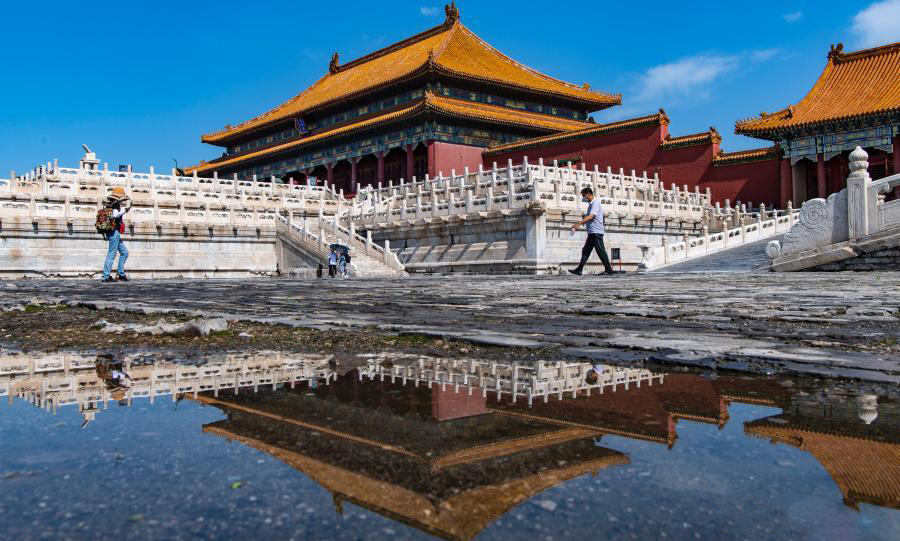Roundup: Difference remain about Iranian nuclear issue as Biden concludes visit to Israel
JERUSALEM, July 15 (Xinhua) -- U.S. President Joe Biden concluded his visit to Israel on Friday after pledging to curb Iran's nuclear program, but had disagreements with his host, Israel's caretaker Prime Minister Yair Lapid, about the ways to do so.
Biden arrived in Israel on Wednesday, starting his first visit to the Middle East as U.S. president, which also included trips to the West Bank city of Bethlehem and Saudi Arabia on Friday.
He was welcomed in Israel, where the Israeli government leaders called on him to take military action against Iran.
On Thursday, Biden and Lapid signed the so-called "Jerusalem Declaration," in which the U.S. pledges not to allow Iran to acquire a nuclear weapon even at the cost of using "all elements of its national power."
Under the declaration, Washington affirmed its commitment to work together with allies "to confront Iran's aggression and destabilizing activities, whether advanced directly or through proxies."
At a joint press conference after a one-on-one meeting, Lapid expressed growing concerns over Iran's nuclear ambitions and called for stronger U.S. action against it, stressing "in order to protect freedom, sometimes force must be used."
For his part, Biden said that he still wishes to give diplomacy a chance to halt Iran's nuclear program, saying a military action would be a "last resort."
While acknowledging that Israel is facing "threats," Biden reaffirmed the U.S. "ironclad commitment" to Israel's security.
Also on Thursday, Biden convened in Jerusalem a multilateral conference alongside Lapid, with the United Arab Emirates' (UAE) President Mohammed bin Zayed Al Nahyan and Indian Prime Minister Narendra Modi joining remotely.
During the conference, the leaders decided to establish a 2-billion-U.S. dollar food corridor between India and the UAE using Israeli technology and capabilities. They also decided to start a 300-megawatt wind and solar energy storage project in India using Israeli, Emirati and U.S. technologies.
The virtual meeting marked the first of its kind of the I2U2 forum, which was established in 2021 following the implementation of the Abraham Accords, a series of U.S.-brokered normalization deals that Israel signed in 2020 with the UAE, Bahrain and Morocco.
On Friday, Biden traveled to the West Bank to meet Palestinian President Mahmoud Abbas. In joint statements after the meeting, Biden reaffirmed his support for a two-state solution to the Israeli-Palestinian conflict.
In the afternoon, hours after the Saudi Arabia announced new rules that will allow Israeli commercial planes to fly over the kingdom, Biden departed to Jeddah, Saudi Arabia, for talks with Saudi officials. He will also participate in a conference with officials from regional countries.
Photos
Related Stories
- America's freight rails waiting for Biden's intervention to avoid nationwide strike
- Roundup: Biden voices support for two-state solution, pledges aid to Palestinians
- Palestinian factions reject Biden's Middle East visit, call for protests
- Biden arrives in Israel, starting Middle East trip
- Palestinians disappointed with U.S. policy ahead of Biden's visit
- Hamas says Biden's Middle East visit not to help promote Palestinian cause
- Biden's upcoming first Mideast visit clouded by indelible U.S. human rights record
- Palestine accuses Israel of escalating tension in West Bank ahead of Biden's visit
- Biden's communications director to leave White House
- Biden calls on Congress to suspend federal gas tax for 90 days
Copyright © 2022 People's Daily Online. All Rights Reserved.









